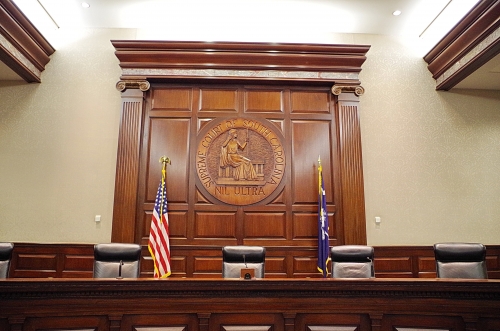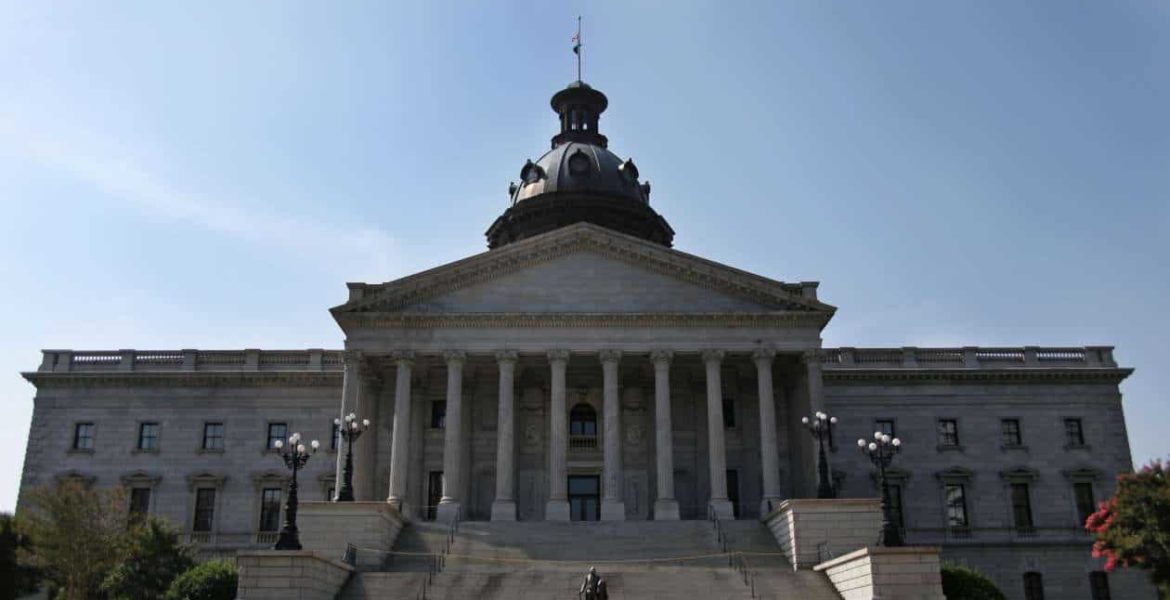Fast Facts: A Review of South Carolina’s Judicial Selection Process
The judiciary of the United states is the subtle corps of sappers and miners constantly working under ground to undermine the foundations of our confederated fabric.
A judiciary independent of a king or executive alone, is a good thing, but independence of the will of the nation is a solecism, at least in a republican government.
—Thomas Jefferson, Letter to Thomas Ritchie, December 25, 1820
Judging the Judges
In the high-profile brawls in Washington over U.S. Supreme Court nominees, conservatives have fought hard to appoint federal judges who will be “strict constructionists” or “textualists” —interpreting the law as it is written, and not as they would like it to be. Jefferson warned against the anti-democratic judicial impulse as “solecism” (incorrect behavior). In our time, we know it simply as “legislating from the bench” or “judicial activism.”
This begs the question: how do we vet and elect our judges in South Carolina? How can we make sure our process in the Palmetto State prevents black-robed legislating?
Electing a Judge?
Since the dawn of representative democracy, selecting judges has always been a tricky business.
Candidates for President, Governor, Senator, or Representative “campaign” for office. They ought to. Those who would govern should lay out their platforms and earn our votes.
But the idea that a judge would “politic” for office seems inappropriate. We would like to believe that a judge is more like a priest or pastor rather than a mere elected official. It is a paradoxical that jobs that require wisdom and a certain temperament or even calling can be filled by methods little different from political beauty contests.
Judges in America are chosen by variations on one of three methods: direct election by the citizenry (22 states including North Carolina and Georgia), appointment by an executive like a President or a Governor with or without consent or confirmation of an elected body or commission (26 states including Tennessee and the United States), or selection by a legislative body (Virginia and South Carolina).
The South Carolina Process
The justices of the South Carolina Supreme Court as well as judges of the other courts: Appeals, Circuit, Family, and Administrative Law, are elected for set terms (not for life) by the South Carolina General Assembly in a joint assembly where every Senator and Representative has one vote. A majority rather than a plurality is required, so multiple ballots are not uncommon. Sitting members of the General Assembly are no longer permitted to run for judicial office.
To qualify for the joint assembly contest, judicial candidates are vetted by a Judicial Merit Selection Commission (JMSC). The JMSC is controlled by the General Assembly with the Speaker of the House making five appointments, the Senate Judiciary Chairman making three appointments and the Senate President making two appointments. The JMSC is composed of six lawyer legislators and four non-legislator lawyers. The members of the Citizens Committees on Judicial Qualifications, whose purpose is to provide feedback to the JMSC from citizens in local communities familiar with the candidates, is appointed by the legislator chairing the JMSC.
The role of the JMSC is to ascertain whether judicial candidates are qualified for service on the bench. The Commission’s finding that a candidate is “qualified” means that the candidate satisfies both the constitutional criteria for judicial office and the Commission’s evaluative criteria. The Commission investigates and interviews each candidate who has declared his or her intention to seek a judicial seat.
The introduction to JMSC’s own report on its findings summarizes the investigation and interview process:
The Commission’s investigation focuses on the following evaluative criteria: constitutional qualifications, ethical fitness, professional and academic ability, character, reputation, physical health, mental health, experience, and judicial temperament. The Commission’s investigation includes the following: (1) survey of the bench and bar through BallotBox online; (2) SLED and FBI investigation; (3) credit investigation; (4) grievance investigation; (5) study of application materials; (6) verification of ethics compliance; ii (7) search of newspaper articles; (8) conflict of interest investigation; (9) court schedule study; (10) study of appellate record; (11) court observation; and (12) investigation of complaint
In interviews, the Commission asks candidates their views on issues peculiar to service on the court to which they seek election. These questions are posed in an effort to provide members of the General Assembly with more information about candidates and the candidates’ thought processes on issues relevant to their candidacies. The Commission also engages in a more probing inquiry into the depth of a candidate’s experience in areas of practice that are germane to the office he or she is seeking. The Commission feels that candidates should have familiarity with the subject matter of the courts for which they offer, and feels that candidates’ responses should indicate their familiarity with most major areas of the law with which they will be confronted.
The judges of the lowest level of courts, Summary Courts, are appointed by the Governor with the advice and consent of the local State Senator, but in practice the Senators really do the picking. Summary Court judges, also known as magistrates, are the judges that touch more citizens than any other because magistrates have jurisdiction over all lesser offenses—those which are subject to a fine not exceeding $500 or imprisonment not exceeding 30 days, or both. Magistrates also set bail, conduct preliminary hearings, and issue arrest and search warrants.
The South Carolina Practice
The South Carolina method of selecting the majority of our judges has its advantages. Being subject to the combined decisions of 170 elected individuals seems like a good hybrid between one person making the decision and three million people, most with no legal background, making the choice.
But every selection method has its weaknesses, with some deficiencies being more readily apparent than others. The South Carolina method has a number of weaknesses in need of immediate improvement:
- The Magistrate (Summary Court) selection system essentially sets up the Governor to rubber stamp nominees, who undergo no standardized oversight or vetting, from the local Senator. According to the statute, anyone seeking appointment as a magistrate must pass an eligibility examination, attend an orientation program, pass a certification examination, and attend a specified number of trials prior to conducting a trial themselves. But a recent investigative report by the Post & Courier drew attention to the fact that magistrates don’t have to be attorneys or have any experience relevant to the job. The P&C later editorialized that Summary Court judges “have less required training than the state’s barbers or masseuses.”
- Lawyer-legislators have an outsized role in picking the judges in front of whom they could—and often do—practice. This practice is ripe for potential conflict of interest.
- The Judicial Merit Selection Commission (JMSC) advances three or fewer candidates per judicial office even if they find more than three qualified for the office.
- Horse-trading in the legislature can lead to an inferior candidate being put on a bench simply because it is that region/gender/demographic’s “turn.” “Help me get a Spartanburg judge on the Supreme Court and I will help you get an Horry judge (and/or your former law partner) on the Court of Appeals.” Sometimes a judge is confirmed just because they were the “runner up” the last time they stood for election. Actual candidate quality and philosophy too often takes a backseat to these ancillary considerations.
- The sheer volume of judicial candidates can overwhelm the JMSC’s screening This is a problem for the General Assembly as a whole as well, when dozens of candidates flood the lobby to “grip ‘n’ grin.”
- The July 1, 1997 changes to the process and the Citizens Committees on Judicial Qualifications have added rigor, but these Citizens committees are not truly independent as they are appointed by the JMSC
- Some members of the General Assembly have raised questions about whether complaints against sitting judges make it into the sunlight during the re-election review process.
Troubling Consequences: Judicial Overreach
Due to these weaknesses, a strict-constructionist General Assembly could unwittingly send (and have indeed sent) liberal, revisionist, or activist judges to the bench.
As a consequence, judicial overreach in recent years has impacted policies touching everything from education funding and taxes, to the environment, school choice and religious liberty. A cursory survey of cases yields several high-profile examples:
- Attempting to usurp the role of the General Assembly to determine the adequacy of funding for public education (Abbeville County School District, et al. v. State of South Carolina, et al.).
- Initially ordering the [Episcopal] Diocese of South Carolina, an organization that pre-datesthe existence of The Episcopal Church [in the United States] to turn over its property to the national church (The Protestant Episcopal Church in the Diocese of South Carolina v. The Episcopal Church).
- Upholding a Governor’s dismissal of a state board member to advance partisan purposes (Hodges v. Rainey).
- Jumping the gun to overturn DHEC approval of the Savannah Harbor Expansion Project (SHEP) before all issues had reached the court (Savannah Riverkeeper v. SCDHEC).
- Parsing the State Constitution to find a one-time emergency school choice program to aid poor students in private educational settings unconstitutional, while dismissing requests for clarification of the ruling and thereby leaving millions in needed COVID relief for Historically Black Colleges and Universities and other private education institutions in the lurch (Adams et al. v. McMaster et al.).
Ideas for Reform
A short list of reforms could include.
- Advance more qualified candidates. Once the JMSC deems a judicial candidate qualified, that candidate could be advanced to the General Assembly, no matter how many contenders that would place on the ballot for a given seat. Another option would be to advance up to five rather than up to three candidates. (S.192 and H.3448, bills filed for the 2021-22 session, if passed would advance all qualified candidates.) Legislation introduced in 2019 (S.903) by Sen. Tom Davis (R-Beaufort) would also increase the minimum mandatory legal training for Magistrates and review previous convictions of defendants by Magistrates who were not licensed to practice law in South Carolina at the time.
- Prevent family members of members of the General Assembly from being elected to judgeships. (A bill has been filed for 2021-2022 that would accomplish this.)
- Change the composition of the JMSC and limit terms of legislative members. Other reforms contained in S.192 include the addition of six members of the general public, three appointed by the Governor and three by the Chief Justice of the Supreme Court. That legislation also provides a seat to a representative of the South Carolina Bar Association and limits legislative members to no more than four consecutive years on the panel.
- Ensure that all complaints against sitting judges are investigated as a part of their bids for re-election or a higher judicial office. Because South Carolina judges are elected for set terms, not life, a judge could be defeated for re-election. That is a positive potential safeguard against abuse. But, due to our South Carolina culture of nicety, the occasions on which a judge is not retained is rare. Sen. Tom Young (R-York) has introduced S.246 which would require Magistrate judges who have been reprimanded or disciplined by the Supreme Court or another disciplinary authority to be approved by the majority of the Senate before being appointed.
- Require that all judicial candidates receive the advice and consent of the House and Senate Judiciary Committees. This reform would allow for more legislators to fully vet judicial candidates and provide an opportunity to question candidates on the record.
- Require that any member of the General Assembly be given the ability to question any candidate for judicial office on the record.
- Require the successful candidate to receive a majority of votes in both the Senate and the House rather than an aggregate majority. (This provision is also in S.192.)
- The Supreme Court is ripe for its own set of reforms. For example, when a justice recues himself or herself from a case, there should be a rotation of appellate court justices to fill the recusal vacancy instead of allowing the Chief Justice to potentially put his or her thumb on the scale for a clearly preferred outcome.
It is clear that another wave of reform of South Carolina’s judicial selection process is warranted to prevent “legislating from the bench” and ensure “equal justice under law” for every citizen in our state.





